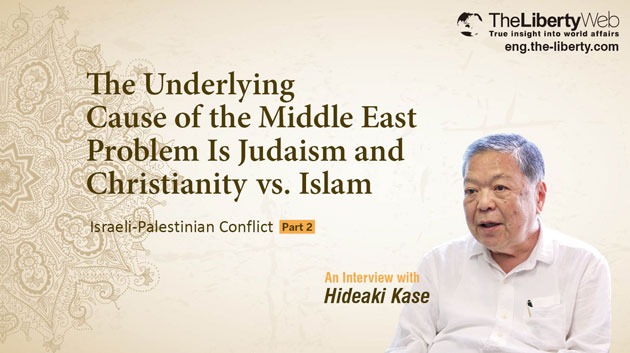The Underlying Cause of the Middle East Problem Is Judaism and Christianity vs. Islam
An Interview with Hideaki Kase
The following is an interview with Mr. Hideaki Kase who is well versed in Middle East affairs. We talk with him about the outline of the Israeli-Palestinian conflict.
Diplomatic Critic: Hideaki Kase

Hideaki Kase was born in Tokyo in 1936. Since 1977 he served as special advisor to the prime minister in both the Fukuda and the Nakasone Cabinets. After working as the first chief editor of Encyclopedia Britannica, he is now engaged in writing books and giving lectures at home and abroad. Among his many publications is included “The Wisdom of the Jews: The Secret of a Group of the World’s Greatest Success” (published by Aspect Corporation) and “Islam Note.” (Published by Happy Science Press).
The overriding problem with the Israeli-Palestinian conflict is that Islamic Hamas has taken control of the Gaza Strip. Hamas has launched rocket attacks on Israel from the densely populated areas near hospitals and schools, using the local population as a shield. Israel has fought back, and, as a result, many innocent Palestinian citizens in the Gaza Strip have been killed.
Israel says that if Hamas halts its rocket strikes, it is ready to respond to ceasefire talks, but Hamas refuses to acknowledge the existence of Israel, so there appears to be no way to negotiate a peace.
What is worse, in June of this year, the moderate Fatah party, that had been engaged in peace negotiations with Israel, agreed to the make-up of a national unity government with its longtime rival party, Hamas. This has allowed the extremist group Hamas to join the Palestinian Authority, making dialogue increasingly difficult.
The Conflict Among Muslims Makes the Problem More Complicated.
The underlying cause of the Middle East problem is the confrontation of “Judaism and Christianity in Israel and the West vs. Islam in the Arab world and Iran.” Adding to this is the Islamic sectarian conflict, which has made the situation much more complicated.
One such conflict in recent years is the Syrian Civil War, wherein Sunni Muslim countries like Saudi Arabia and Egypt have provided money and arms to the anti-Assad rebel groups that are trying to overthrow the Shiite government led by al-Assad.
These anti-Assad rebels are Sunni Muslims and many al-Qaeda-linked militants have joined them.
On the other hand, the post-Hussein government that was formed in Iraq after the Iraq War was a Shiite-led government. Therefore, many Sunni Muslims in Iraq claim they are treated poorly by the current Shiite-led regime, and increasingly show their support to the Sunni extremist group, the Islamic State (IS).
Previously, Israel was the primary adversary of the Arab nations. However, now that Sunni and Shia have begun a death match, the sworn enemy of the Sunni Muslim nations like Saudi Arabia and Egypt, are the Shiite Muslims rather than Israel. If Israel were to disappear, the Shiite’s would extend their influence, which would be undesirable for the Sunni countries.
The United States has been carrying out airstrikes on the Islamic State , which has already seized territory across Iraq and Syria. However, this meant the U.S. ended up helping the Assad regime in Syria and thus helping Iran, an ally of Syria, complicating issues further as. Iran is hostile to Israel, a major U.S. ally.
Amid the chaotic situation of “today’s friend is tomorrow’s enemy”, Israel has no other alternative in the meantime but to be heavily armed like a quilled hedgehog.



















